InteSoul Leadership Podcast
Welcome to InteSoul Leadership Podcast: Empowering Authentic Leadership Hosted by a visionary leader whose life story embodies resilience, compassion, and a relentless pursuit of justice, ”InteSoul Leadership” is more than a podcast – it’s a movement towards authentic and transformative leadership. From the nurturing guidance of her parents, our host learned early on to stand firm for what is right, even in solitude. Her childhood, marked by both the protective love of her greatest leaders – her parents – and the harsh realities of racial injustice, shaped her understanding of leadership’s true essence. Her first encounter with racial prejudice in kindergarten, where she faced indifference from those meant to lead and protect, set the stage for her lifelong commitment to fighting bias and championing equity. This commitment was further solidified when her father, her hero, stepped in to demand accountability and justice, instilling in her the power of assertive, compassionate leadership. Carrying these lessons through her diverse experiences in education, the workforce, and ministry, she has witnessed the spectrum of leadership – from those who let biases cloud their judgment to those who lead with an inclusive and loving heart. Her experiences have forged a deep-rooted love for all people, transcending the pain of past injustices. Now, as the host of ”InteSoul Leadership,” she is on a mission to inspire a million leaders worldwide to lead with a healthy soul, embracing love for humanity. Her goal is to cultivate leaders who not only look and sound different but also leave a positive, lasting impact on everyone they encounter. ”Great Leaders own their story and empower other Leaders to be authentically successful.” This is the mantra that drives each episode of the podcast, where we delve into the depths of Leadership Transformation, Empowering Leaders, Building High-Performing Teams, and more. We invite corporate, academic, and church leaders to join us in this journey of personal growth, spiritual enlightenment, and practical leadership strategies. Subscribe to InteSoul Leadership – where leadership meets soul, and every episode is a step towards creating a world where every leader leads with authenticity and love.
Episodes
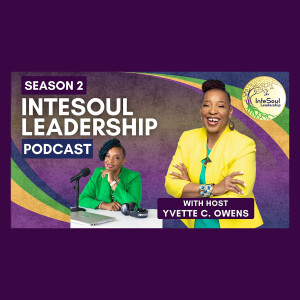
Thursday Jan 16, 2025
Thursday Jan 16, 2025
Summary
In this episode of InteSoul Leadership, Yvette Owens and Raghu Kale delve into the true meaning of excellence in leadership and organizations. They explore how excellence is not synonymous with perfection but is rooted in passion, purpose, and a systemic approach to organizational culture. Raghu shares insights from his extensive experience in various industries, emphasizing the importance of aligning personal values with organizational goals. The conversation highlights practical steps leaders can take to foster a culture of excellence and the critical role of communication in achieving organizational success.
Takeaways
Excellence is a multi-dimensional concept that varies for individuals and organizations.
True excellence is driven by passion and a clear understanding of purpose.
Organizations must align their processes and people to achieve excellence.
Leadership is about genuine action, not just a title or position.
Change within organizations should be strategic and purposeful, not arbitrary.
The health of an organization is reflected in its processes and communication.
Great leaders balance running the business with changing it for the better.
A culture of excellence requires everyone in the organization to be on the same page.
Loyalty in business involves a sense of sacrifice for the greater good.
Continuous improvement and learning are essential for sustaining excellence.
Chapters
00:00 Introduction to Excellence in Leadership06:11 Defining Excellence: Personal and Organizational Perspectives12:44 The Framework of Organizational Excellence18:27 The Role of Passion in Organizational Culture21:36 Practical Steps to Reinforce Excellence28:32 Leadership: Running and Changing the Business32:09 Conclusion and Future Insights
BRIEF PROFILE OF MY GUEST — Raghu Kalé
As the Founder and CEO of Striking Ideas LLC, I specialize in (a) Publishing, (b) Films and Documentaries, (c) Strategy Execution, and (d) Corporate Brand Identity, seamlessly combining creativity with strategic precision to deliver impactful narratives, actionable strategies, and enduring legacies.
Strategic communications form the cornerstone of my approach, driving business transformations and fostering operational excellence. With a proven track record of steering teams and crafting compelling messages, I have consistently enabled organizations to build transformative brand identities and achieve exceptional outcomes.
The L&S Principles, a concept I explore in my book "Loyalty and Sacrifice — Ushering New Horizons for Business Leaders in The Digital Age," offers a transformative perspective on loyalty. Endorsed by Dr. Edward de Bono and global leader Ratan Tata in their forewords, the book amplifies my propositions of redefining loyalty. It challenges a 200-year-old norm of customer loyalty that is not relegated to repeat purchases as a defining paradigm of loyalty. It presents a unified definition of loyalty that extends to all stakeholders. This innovative approach redefines the engagement framework, fostering enduring trust and creating value across organizational ecosystems.
Loyalty and Sacrifice: Ushering New Horizons for Business Leaders in the Digital Age
Book Purchase link to Amazon: https://a.co/d/20yuQWV
Granular details of 10 chapters Link: https://striking-ideas.com/loyalty-and-sacrifice
About the Book: Loyalty and Sacrifice are inseparable. In the case of war heroes and employees, sacrifice is well recognized and celebrated. In the case of customers, the question is: are customers capable of sacrifice? This book proposes a holistic and uniform definition of loyalty and embraces its hidden facets to re-define customer loyalty. It provides a new framework with four axioms of loyalty and four L&S Principles supported by over 30 true accounts. A new concept of Latency Factors, based on cognitive bias and mental patterns, that identifies the blind spots in our thinking, is also introduced in this book. The relevance of this book is timely as the world is witnessing rapid digital progress. Only if basic definitions are precise, can advanced algorithms be useful for worthwhile human progress.
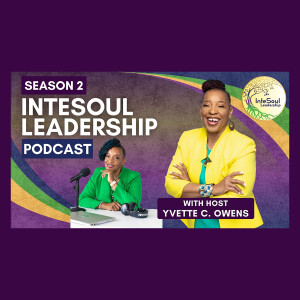
Thursday Dec 19, 2024
Thursday Dec 19, 2024
Summary
In this episode of InteSoul Leadership, Yvette Owens and Dr. Carrie Graham discuss the critical role of training and education in ministry. They explore how effective teaching strategies can empower congregations to engage with and apply God's Word in their lives. The conversation emphasizes the importance of understanding the needs of the congregation, building accountability, and encouraging new leadership within the church. Dr. Graham shares her ERA principle (Engagement, Retention, Application) as a framework for enhancing learning and spiritual growth. The episode concludes with personal testimonies and a call to action for leaders to embrace excellence in their ministry efforts.
Takeaways
Training is essential for effective ministry across all sectors.
Christian education begins in the church and is vital for growth.
Engagement with God's Word requires understanding the audience's needs.
Teaching should focus on practical application of scripture.
Empowering congregations involves providing opportunities for success.
Accountability within faith communities fosters growth and learning.
The ERA principle can enhance the learning experience in ministry.
New leaders should be encouraged and supported in their roles.
Personal testimonies can inspire and motivate others in their faith journey.
Excellence in leadership is a calling that should be embraced.
Chapters
00:00 Introduction to InteSoul Leadership08:46 Strategies for Effective Teaching18:26 Building Accountability in Faith Communities23:46 The Application of the ERA Principle33:10 Personal Testimonies and Spiritual Growth39:12 Final Thoughts and Call to Action
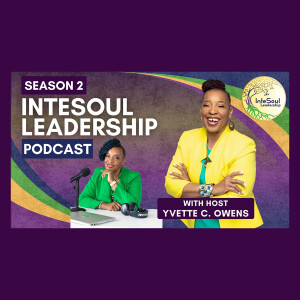
Thursday Dec 12, 2024
Thursday Dec 12, 2024
Summary
In this episode, Yvette Owens and Dr. Carrie Graham discuss the critical importance of strategic planning in training and development. They emphasize the need for organizations to invest in their employees through comprehensive training strategies that assess needs, engage learners, and ensure retention and application of skills. The conversation highlights the role of training coordinators and the necessity of involving them in the planning process to create effective training programs. The episode concludes with a call to action for leaders to prioritize training and development in their organizations.
Takeaways
Investing in training is essential for employee engagement.A strategic plan is necessary for effective training.Assessing training needs helps identify areas for improvement.Engagement in training leads to better retention of information.Application of skills is crucial for effective training outcomes.Checkpoints help reinforce learning and application of skills.Involving training coordinators enhances the training process.Training should be proactive rather than reactive.Understanding the learner's background improves training effectiveness.Leadership development should be ongoing throughout an employee's career.
Chapters
00:00 Introduction to Training Strategies03:01 The Importance of Strategic Planning06:06 Assessing Training Needs08:54 Engagement in Training12:00 Application of Training15:07 Retention and Reinforcement17:45 The Role of Checkpoints in Training20:58 Involving Training Coordinators24:08 Conclusion and Future Conversations
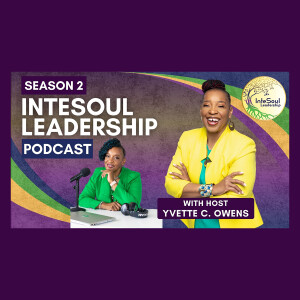
Thursday Dec 05, 2024
Thursday Dec 05, 2024
Summary
In this episode of InteSoul Leadership, Yvette Owens and Dr. Carrie Graham discuss the critical importance of training budgets in organizations, especially during times of financial strain. They emphasize that cutting training budgets sends a damaging message to employees about their value. The conversation explores the necessity of a comprehensive training strategy that considers the needs and experiences of employees, particularly during periods of change. They advocate for leveraging internal expertise and creating mentorship programs to facilitate knowledge transfer and engagement. The episode concludes with a call to action for leaders to invest in their people and develop a culture of continuous learning.
Takeaways
Leadership requires courage and commitment.
Cutting training budgets can harm employee morale.
Investing in training is crucial for organizational success.
Change management needs a solid training strategy.
Understanding employee needs is key to effective training.
Internal expertise can enhance training effectiveness.
A comprehensive training strategy prepares for unforeseen challenges.
Knowledge transfer is vital for organizational continuity.
Mentorship programs can bridge generational gaps.
It's never too late to implement a training strategy.
Chapters
00:00 Introduction to Leadership Challenges03:10 The Importance of Training Budgets05:48 Navigating Change Management08:58 Developing a Training Strategy11:49 Understanding Audience Needs15:07 Leveraging Internal Expertise18:04 Creating a Comprehensive Training Strategy20:57 The Value of Knowledge Transfer24:09 Building a Mentorship Culture26:54 Conclusion and Call to Action
It is time to create a leadership culture that attracts and not repels. Stop Flying Solo! Join Our Facebook Community! Click Here InteSoul Leadership | Facebook
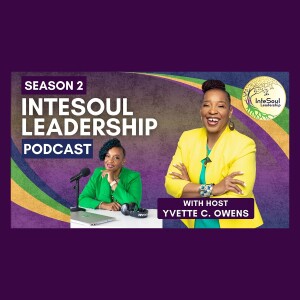
Thursday Oct 03, 2024
Thursday Oct 03, 2024
Summary
In this episode of InteSoul Leadership, Yvette Owens and Adrienne Davis discuss the evolving landscape of leadership, emphasizing the need for organizations to transition from good to great and, ultimately, to brilliance. They explore the importance of compliance in leadership, strategies for employee retention in the wake of the Great Resignation, and the necessity of training future leaders. The conversation also delves into change management, the significance of staying true to a company's vision and mission, and the role of community engagement in fostering a supportive organizational culture.
Takeaways
Leaders must evolve from good to great to brilliant.
Compliance is crucial to avoid legal issues and fines.
Employee retention strategies are essential in today's market.
Training future leaders is a priority for organizational growth.
Change management is vital for company success.
Staying true to the company's vision is essential.
Engagement and appreciation can significantly impact retention.
Organizations should conduct regular SWOT analyses.
Community resources can support organizational development.
Partnerships in HR can enhance organizational culture.
Titles
Vision-Driven Leadership
Training Tomorrow's Leaders
Sound Bites
"We need to go from good to great to being brilliant."
"We want to make sure that we encompass an employee engagement."
"We want to be one team."
Chapters
00:00 - Unlocking Leadership Brilliance
03:07 - The Importance of Compliance in Leadership
06:12 - Retention Strategies in the Great Resignation Era
12:01 - Training for Future Leaders
14:01 - Navigating Change Management
16:44 - Staying True to Vision and Mission
20:05 - Community Engagement and Resources
CT Paid Sick Leave Training: January 1, 2025, Updates
Prepare Your Business for the New Compliance Changes
November 7th, 2024 | 2:00 PM EST
Are you ready for the new CT Paid Sick Leave law changes starting January 1, 2025?
Registration Page: https://link.anovahcsinc.com/ct-paid-sick-leave-training/
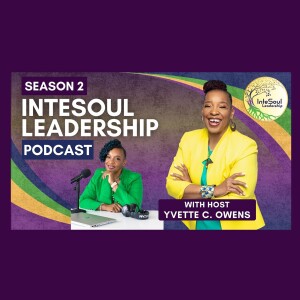
Thursday Sep 26, 2024
Thursday Sep 26, 2024
Summary
In this conversation, Yvette Owens and Natasha Welcombs discuss the importance of leadership in fostering inclusive environments for English language learners. They explore the unique challenges faced by these individuals in the workplace, the significance of understanding cultural differences, and the need for leaders to appreciate the value each team member brings. The discussion emphasizes the role of empathy, collaboration, and the necessity of creating welcoming spaces for diverse voices. Natasha shares her experiences and insights on how organizations can better support multilingual teams and the importance of language acquisition in various contexts.
takeaways
Leaders must adapt to support English language learners.
Language diversity can be an asset in the workplace.
Microaggressions can impact the confidence of multilingual learners.
Understanding cultural differences is crucial for collaboration.
Creating a welcoming environment starts with recognizing our common humanity.
Different does not mean deficient; everyone brings value.
Empathy in leadership fosters trust and collaboration.
Language acquisition is a complex process that requires patience.
Organizations should provide resources for language training.
Building relationships with team members enhances workplace dynamics.
Titles
Cultural Understanding in Leadership
The Role of Empathy in Team Dynamics
Sound Bites
"How can organizations create a more welcoming environment?"
"Different doesn't mean deficient."
"Where there's greater trust, there's greater collaboration."
Chapters
00:00 - Introduction to Leadership and Language Diversity
03:11 - Challenges Faced by English Language Learners
06:05 - Creating Inclusive Work Environments
08:56 - Understanding Cultural Differences
12:09 - The Importance of Individual Value in Teams
15:01 - Overcoming Leadership Challenges with ESL Teams
17:55 - Expanding Services for Multilingual Support
21:14 - The Journey of Language Acquisition
24:10 - Conclusion and Call to Action
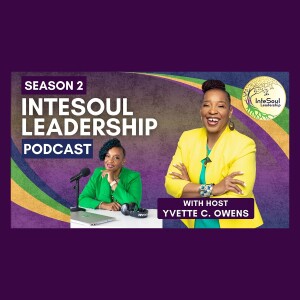
Thursday Sep 12, 2024
Thursday Sep 12, 2024
Summary
Desire Cruz, the owner of Merge Worldwide, shares her journey of building an organization inspired by her daughter's life. She emphasizes the importance of heart-centered leadership and the impact it has on individuals and organizations. Desire discusses the five key pillars of heart-centered leadership: healing, empowerment, taking action, relationships, and transformation. She encourages leaders to start with themselves and develop these pillars to create a positive and impactful leadership style. Desire also invites listeners to join her upcoming five-day challenge to explore heart-centered leadership further.
Takeaways
Heart-centered leadership is essential for creating a positive and impactful organizational culture.
Leaders should start with themselves and focus on healing, empowerment, taking action, building relationships, and personal transformation.
Heart-centered leaders prioritize the well-being and growth of their team members.
Heart-centered leadership requires vulnerability, self-awareness, and a commitment to personal development.
Joining challenges and programs focused on heart-centered leadership can help leaders enhance their skills and create a positive impact.
Titles
Empowering Others and Taking ActionBuilding Strong Relationships in Leadership
Sound Bites
"Everybody has a story. And everybody's story matters.""Heart is not a place of weakness.""Empowering people brings self-confidence and self-awareness."
Chapters
00:00 Introduction to InterSoul Leadership and Desiree Cruz03:02 Building an Organization Inspired by Heart-Centered Leadership09:00 The Importance of Heart in Leadership13:10 The Five Pillars of Heart-Centered Leadership17:10 The Role of Relationships in Heart-Centered Leadership19:56 Transforming Mindset and Living in Purpose24:53 Join the Heart-Centered Leadership Challenge
Consider joining Desire for her 5-Day ChallengeMy five-day heart challenge is a personal development challenge that leans into five key pillars: healing empowerment, action relationships, and transformation ❣️It begins Sept 16-20, 7-8 pm EST via Zoom$ It is $97 for the challenge only * VIP is 197$ and includes a 45-minute call with me separately, more personalized to your personal development journey. ***All payments can be sent to my Venmo desire-Cruz-2*** ***Lock in your spot**
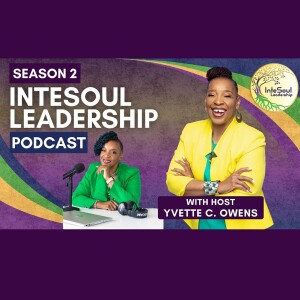
Thursday Sep 05, 2024
Thursday Sep 05, 2024
Summary
In this conversation, Yvette Owens interviews Catrice Cornett, CEO of HP Visual Connections, about the importance of sound leadership. They discuss how leaders should show up and leave people feeling, the sound of quality leadership, and the balance between confidence and compassion. They also explore the role of kindness and gratitude in leadership, the need for discipline and accountability, and the value of cross-pollination among leaders in different industries. The conversation concludes with discussing the InterSoul Leadership community and the benefits of joining.
Leaders should show up and leave people feeling a certain way; sound plays a crucial role in this.
Quality leadership requires a balance between confidence and compassion.
Leaders should be grateful for the people who choose to follow them and be conscientious about serving them.
Discipline and accountability are necessary for helping people reach their potential.
Cross-pollination among leaders in different industries can broaden perspectives and lead to excellence.
The InterSoul Leadership community provides support, resources, and a space for leaders to grow and learn from each other.
Titles
The Sound of Quality Leadership
Cross-Pollination Among Leaders
Sound Bites
"There's a sound to quality leadership."
"Confidence is key, and you can hear it."
"Leaders need to be more conscientious about the people they serve."
Chapters
00:00 Introduction to the Importance of Sound in Leadership
02:28 The Sound of Quality Leadership
05:08 Balancing Confidence and Compassion
08:29 Gratitude and Conscientious Leadership
12:35 Discipline and Accountability in Leadership
30:19 Cross-Pollination Among Leaders
35:53 The Benefits of the InterSoul Leadership Community
Keywords
leadership, sound, confidence, compassion, gratitude, discipline, accountability, cross-pollination, InterSoul Leadership
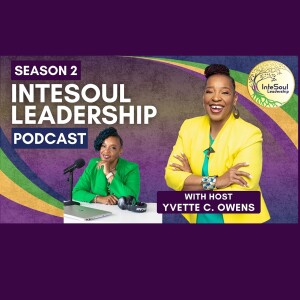
Thursday Aug 29, 2024
Thursday Aug 29, 2024
Hello, and welcome to another episode of InteSoul Leadership. We support leaders in all aspects; whether you're in corporate or leading a community or even a ministry, leadership matters. And it matters because you not only have the organization that you're responsible for but also the people, and therefore, the processes and the technology that you engage in your organization are critical for your success.
I am so, so elated to have Sonia from Latin Financials. She is an amazing woman and brings so much energy to every place that I've seen her in. And she's so transparent. I thought it would be great for her as a tremendous leader, not only in the United States but also leadership in other countries, to be able to bring her insight concerning leadership and numbers. Because sometimes we go and do business, but we're not about being business. And to be about business, we have to be about every aspect of our business, which includes the numbers.
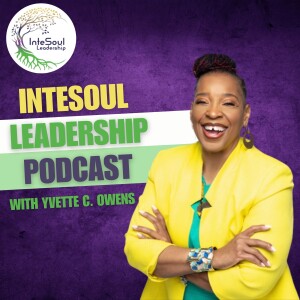
Thursday Aug 22, 2024
Thursday Aug 22, 2024
Yvette Owens (00:03)Hello and welcome to InterSoul Leadership, a segment of my business, Destiny Speak, Inc. It's my pleasure to be here today with Donna Carter, who is part of the Clark County Equity Coalition. I'm just gonna pop that up so you can see that she founded this coalition out of a passion for her,
We're having these conversations with inter-soul leaders. These are members who have joined the inter-soul leadership community, which I launched. This community really gives leaders a safe place to know that they're not alone in wanting to stand for our integrity, have authenticity in what they're doing, and really.
Making a change for the organization's products and services and the people working alongside them. It's a holistic approach to leadership. And I'm honored to be with these leaders and have them come along. We're highlighting these leaders so that if you are feeling like you're flying solo and you have people around you who are not
holding up to the same standards that you want to hold up to and you're wondering what's going on in the world or even how do we navigate this new world? I invite you to join the InterSoul Leadership Community. I'll have a link where you can learn how to join and get started with us. We would love to have you. I believe I call it momentum. We're setting a momentum. It's a movement for leaders who want to make a difference for the people they are leading and help everybody around them within their influence to excel, right? And when we do that, it's not just about collaboration, but it's about getting the greater of the good because we have the community working towards their greatness. So with all that said, I'm going to welcome Mrs.
Donna Carter of the Clark County Equity Coalition. Woo hoo. Hi. Hi, how are you? And Donna, again, thank you for joining us. Would you please explain to the audience, I know we're going to get into what the community, InterSoul Leadership Community means to you, but if you could explain to us what you do, how you came about the Equity Coalition, why and where you all are right now.
Yeah, thank you for having me that the Clark County Equity Coalition is a grassroots nonprofit organization that came from a place of bridging a gap. So I'm a parent, my daughter's 14. I live in Kentucky and she was a couple years ago was in a school where there was a survey done and quite a nice percentage of the teachers were not comfortable.
speaking to a child of another race or culture. And so I, you know, give them credit for being honest on the survey. But at the time I was on the site -based decision -making council and asked what was going to be done. And of course they were doing DEI training and all of that. But I know, and we all know that it takes, like you said, an intersoul, a movement.
to make substantial change in areas like that. And so we actually took our daughter out of school for a year because what does that mean for my daughter, a young black girl? And there's not very much representation in the schools. It has improved, but that year I just felt an urging and just a nudge. And I definitely believe it was the Holy Spirit telling me that
Okay, you can do this for your child, but what about those parents who can't? What about those kids who can't? And so I started calling some like -minded people and I have a young woman who partnered with me, Vashay King, and I started calling around and we just, said, hey, let's do something. Got in touch with an organization in Kentucky called The Pritchett Committee, which
is focused on student achievement in the states and the equity of that achievement. And I've gotten in touch with some people there and they said, well, you if you want to start one, just start it. And so we did. Nice. That's how we got started. Nice. And I so appreciate you and the others who have come alongside you for doing this, for making, you know, so many times we say, we see an issue.
but we're like, somebody should do something about that. It's like, okay, you are the somebody. You are the somebody. And it makes sense because you do have a vested interest, your daughter. We want our children to grow up healthy emotionally, as well as physically and spiritually. And we as parents have to steward all those aspects of their lives.
which means we have to get involved and not just talk about it. So kudos to you. And what I thought when I was preparing for this interview is that leaders often have to pioneer a path that's not been laid out for them, An unpaid path, right? Pioneering. And can you talk to us about what does that feel like? Was it overwhelming or?
How did you, if it was, how did you just say it's important enough for me to keep pushing forward? Right. It was overwhelming and there's, and I still feel like I don't know what I'm doing. I'm fortunate enough to have people like you and the InterSoul community and other people around me, past leaders who have been in my life to lean on and also ask questions sometimes. But I just kept talking and
keep asking questions and walking through the doors as they open. And if I have an idea, I'm beyond not thinking that it can happen. So just, if an idea comes, I just think, we can do that, you know? And I have like -minded people who are on the board who feel the same way. Right now, we only have four board members. being very intentional about that.
But we just keep talking, we keep going out and meeting people, knocking on doors. We went and met with the superintendent of the school. We told him what we wanted to do. He was very receptive. And so as we meet people and we talk to people, they get to know us. And then people are starting saying, hey, you have to know this person. Hey, you need to know this person. I heard what you're doing. I want you to meet someone so. So then it becomes where.
we're not even really having to knock on the door. People are bringing people to us because they see what's happening. And I think, I think for me, I do a lot of things, not necessarily scared, but just not knowing and just trusting that, okay, if it doesn't work, doesn't work. But at least let's ask, let's try, let's see. And even now, you know, next year we will have two programs running in the school as opposed to one.
I was kind of here we had the Black and Hispanic Achievers start and this year we will have a senior interpreter co -op which we are very very excited about. And so yeah I think you just keep asking questions. Don't be afraid to you know reach out if you need help because you never know who can help you. And I keep telling people that networking is so important and not just
from me reaching out to you, but when people reach out to me, making sure that I'm also getting back and getting back to them because those relationships have been just awesome to me in this whole situation where people have said, let me call so -and -so for you. And that one phone call, matter of fact, that's how the Senior Interpreter Program really got to be. Awesome. You know, a guy at my church.
works for the University of Kentucky. heard what I was doing. He asked me to email him. I did. He started emailing all these people at University of and put me in touch with Dr. Nia, who's the head of the cardiology for the University of Kentucky College of Medicine. He's over DEI, I think, and started talking to him. And then he put me in touch with the
the director of the interpreters at UK. just, and that was just an innocent, I'm a greeter at church, Dave Fardo, he's a greeter at church, we were just talking one day and that's how that happened. So, yeah. So that's so, and this is so aligning too. I think there's certain things, there's certain pillars, if you will, that leaders have to just be willing to get comfortable in.
and continue to do because Megan, who was our guest a couple of days ago, talked about the power of networking too and how it has enabled her to get and almost rebrand, not almost, rebrand her business so that she was okay with doing what she's doing today. And to your point, it's opening doors and it said, close mouths, don't eat, right? And so...
when you actually go and you share your story, you share your passion, you share the vision. And I talk about the vision performance, authentic communication, empowering yourself and the people around you, and then building resilience in my programs through Destiny Speak when I'm coaching leaders. And so you're talking about how do I make sure my vision is continuing to perform? I share.
the vision with others so that doors can open, we see what's possible and we go after what's possible. And that's amazing. And it's one step at a time. And it sounds like that one step opened a whole bunch of steps for you. Yeah, it sure did. It sure did. I know that you also had the opportunity through this great movement for our students, Black and Brown students, to go to Washington, DC. And can you tell us more about that?
Sure, my partner Vashe King oversees the Black and Hispanic achievers. a year, well, spring break, we took 20 students to Washington, DC. We did some college tours. went to Marshall University, Howard University, University of District of Columbia, all the memorials, National African American History Museum, the Air and Space Museum. I mean, we did it.
We did it all. And this is a group of sixth to 12th graders. And we had parents, grandparents go with us. It was really a nice time. Some of these students had never been out of Winchester or Kentucky. And it was just really a good time for them. And there was minimal that they had to pay. She took care of that. And we just really had a great time. And so we will be kicking off that program again in September.
And I don't know what trip she's planning at the end of this year, but I'm sure it's going to be phenomenal for the kids. the goal, her heart and the heart of the Equity Coalition is to bridge gaps by showing children who don't always have resources what is available to them. Just exposing them to what is available to them so that they can really dream and they can really desire and inspire to be
more. And, you know, we hope that we pour into them that they will come back to the community and be our future leaders. But even if they don't, we want them to know what's available to them. And so that was the goal of that trip. And it was really, it was really, really nice. Weren't you also invited by some group to come and serve or be a part of a discussion around this topic in D .C. even before that trip?
Well, the Pritchard committee, which is the committee where the group I told you that focuses on student achievement with the state in equity, they sponsored us to go to the Ed Trust Conference in Washington, DC. I believe it was the year, it was last year, maybe it was the year before. But that was a phenomenal conference.
They have a conference like that every year, usually in DC. And it's focused around education and topics for marginalized students, for our black and brown students, students who don't always have resources. And this was a power pack conference. mean, there were really some good speakers there and we really learned a lot. we were able to attend that as a
from a sponsorship from the Pritchett committee here in Kentucky. That was really nice. Yeah, and so what you're sharing with us is that you're modeling the way for your students. So as you're encouraging them to be exposed to different things, you too, you all are being exposed to different opportunities. And it was great that the Pritchett committee invited you all there. And so I commend you for really taking something that
You could have gotten really bitter about how your daughter was being treated. You could have. And like you said, you could have walked away and just continued to educate her on your own outside of the system. But there are some things that I like to say and that as we know, there's a call on your life and an assignment on your life that's really a divine assignment, I believe. And we have to answer it. We don't have to, but it's probably in our best interest to answer it.
And it sounds like you have started to see the fruit of your labor and you know that, yep, this was the right thing to do. And just think of how you're showing the, what leadership skills you're showing your daughter about here's something that I care about, here's something that I think should be right when it's wrong. And I'm not just gonna be a voice in the crowd.
complaining about it or things like that, but I'm gonna go for it. And all of that really just speaks to the values of the interest soul leadership community. We know that leadership does not, cannot continue to look like it has in the past for many, in many situations, in most situations. It can't be a dictatorship type thing or do as I say kind of thing.
people learn during COVID that they have choices, right? And so with having choices, we need to make sure we're giving people meaningful work and meaningful opportunities and that they understand the cost and the risk around all of that and willing to go after that. So again, kudos to you and your committee. And what is it that you all need?
as a coalition, how can this audience and those who are going to listen to this on replay, how can we most help you? And I'm going to put your contact information in the post afterwards, but how can we most help you? Yeah. Well, we definitely could use donations. And we were always looking for contacts. I do want to clarify, my daughter didn't really receive bad treatment at the school.
But I think sometimes, sometimes like you said, Yvette, we wanna, we wanna, I could have just, like you said, I could have pulled out, put her in, kept her in private school and just gone about my business. But that would not have helped anyone, you know? And now we're having courageous conversations with, we've had a session with the students, we've had a session with the teachers and staff.
We've had a session with parents and our next session is with the board and the administration. So the good thing about it is that we've learned that most of the teachers in the staff, they want these conversations, they want to learn. was no true opportunity with what they were getting. And so a lot of times we, I didn't get bitter, but you think,
If you have a skill set, and I've been in DEI for years, because HR is my living, and I thought, have a skill set that could help this community. And for me to just sit back and not do that, know, just, know, God wouldn't allow that, and I couldn't do that. So I just wanted to clarify that because the school system has been very receptive. Teachers have been very receptive, and they are welcoming of
of groups who can help. And I also want to say that our education system is overloaded. So really, when you say, what do I need? I need parents and family members and guardians to get engaged. And not just when it comes to the athleticism, athletics and things like that, but to really get engaged. Because after COVID, and even before, teachers are dealing with trauma.
from these kids, there's a huge percentage of our kids whose parents, one of the parents is incarcerated and then you have the drug. So I really need parents to get involved, to be aged in the process. And it's not easy. This is too big of a problem to just say, our education system, it's too big of a problem to do that. So.
We definitely could use donations and if you go to our website, there is a place to donate tax deductible. But we also can use parents to get engaged. And if you're not in our community, I encourage you to be engaged in your own community, in your own education system and in your own schools. Because just being a mentor or being there or
or kids having representation in the schools, even if it's not a teacher, can make a big difference for these children. Yeah, what's your website? I'm going to put it up. It is Clark. You would think I would know this by heart, right? Where's my business card? And while you're looking for that, go ahead. No, go ahead. Go You got it? No, not yet. OK. While you're looking for that, I've
I'm so glad you corrected me because I don't want to cause any shade to any organization, any group, or give any negative impression. I'm so related to hear that the school systems want the help. They just weren't getting the level of help that they needed to really make a difference. And so that is amazing that they're partnering with you all to really
Make that difference, like you said, for all kids. Right. It's Clark, C -L -A -R -S -K -C -O -hyphen, equitycoalition .com.
And we also have a Facebook page, but I can give you all. Yeah, I can put all that. But while we're talking, I wanted to put that up. So here's the website if you are looking to find out more about what they're doing. And again, as Donna is saying, this is happening in Kentucky, Winchester, Kentucky. It started because that's where they're living. But Clark County is the county in which this is all happening.
Maybe you wanna start something in your area. I'm sure if you reach out to them, they'll tell you how they got started. maybe that, and that I'm sure that will help you to be able to start too. let's just talk about the leadership and the InterSoul leadership community and how that's helped you especially.
in this space. Now, I know you've been a leader in corporate and you're HR professional, human resource professional. You've led many, different organizations, even global organizations. So leadership is not a stranger to you or foreign to you, but why, can you tell us why you felt becoming a part of the inter -soul leadership community was important? Well, number one, I know you and
I know what kind of leader you are and over the years, the advice and the mentorship that I've received from you. So that was number one. And so just knowing you, I know that there's going to be like -minded leaders. And I always strive to have a network of people around me who, you you know the old saying, if you're the smartest person in the room, then you're not in the right group. And I am always trying to learn
And sometimes it's just good to go to the group and read to see that, okay, well, I'm not crazy. I'm not the only one and, this is really what's happening, that kind of thing. Because sometimes you're dealing with stuff and you're going through things. Not that you want other people to be going through things, but just to see that you're not the only one.
is really sometimes comforting and to talk and share and to be uplifted because a lot of times you'll send out posts or emails and it's, you know, I'll read it and I'll be like, yeah, you know, it's just what I needed for the day. So I think that's really what draws me to Intersole. Awesome. Can you share a pivotal moment or challenge you?
faced as a leader and how your leadership approach helped you overcome it.
I think, I think a pivotal moment would be, you know, starting a new position and you always, there's always a, that part where you have to get acclimated and you kind of feel like you, know, I'm in over my head because you're learning a new way, a new position, new responsibilities.
And if you're trying to build a team at the same time, I think sometimes it can be difficult. And I think the way that I usually overcome that is just trying to show up authentically and really trying to show up vulnerable and not let myself think that, you know, I don't have all the answers. I don't need to have all the answers. That's why you have a team. And just relying on that and
Because sometimes I'll be saying something and I don't know the answer. And so I'll say I don't know. But then in my mind, I'm thinking, you shouldn't have said you don't know. You can go through all those things. But then I learned over the years that it's OK. I don't have to be the smartest person in the room. I just have to be able to inspire my team and motivate them and empower them.
where they're strong, I may be weak and where I'm weak, they may be strong and that's what makes a team. And so I think learning that has been probably the most important thing and freeing thing, right? Then, you I don't have to go spend hours trying to research something that's not in my lane. Right. Right. You know, because I just want to go to the meeting and be the smartest person in the room. the person who needs to
who really knows do that, right? That's very freeing and has been something over the years that has really helped me to help empower and develop my team. Because if I'm trying to do everything, then what is there left for them to do? That's really good. That's really, really good. And we talk, if when people look at the branding around the InterSoul leadership community, that line I use all the time, which is stop flying solo.
And that means it's like, you know, even if you have a team, but you're trying to do everything, you're flying solo and you're, that's not sustainable. And you're not really building the collaboration and getting the greater of the good from the whole group, as opposed to just yourself. And there's so much more. the inter -soul leadership community, I talk about making sure that
One of my goals is to make sure that we give leaders a safe space where they can test out things, where they can even share where they are at the moment. Because sometimes leaders don't have a safe space to vent, not vent, just vent, but to share ideas and get feedback or even just feel like, do I continue to build as this leader, right?
And so my goal is to have leadership look different and that's just not physical, but our demeanor, right? And our continents, how we even show up that way and sound different and leave people feeling different. How are you doing that in your day -to -day work holding up those type of values?
as you're leading the various organizations that you're leading? I think I like to make sure everybody has a voice and feels heard and valued. I have open communications with my team and the company I work with full -time is all full -time remote. I really have to be intentional about
meeting with them and letting them know I'm available. And then for the coalition, we really have taken, I don't think it's a unique approach, but we invite other organizations. It's not just about us. So there are other organizations who are part of the coalition and they participate and they come and we're not trying to reinvent the wheel.
They, you know, the mental health task force is part of our coalition. The health department here is part of our coalition. And, you know, we support them, they support us, we work together. And when it comes to the school system, you know, there's things that they can offer that we can't and that kind of thing. And so I think being able to be free enough and not
you know, as a leader, not have your ego get in the way of allowing other people to participate and demonstrate their strengths. And they have a lot of strengths. We have a lot of great agencies here who really are doing some great work. And a lot of them are working with the school district. And we have, so we don't need to recreate that, but how can we help you? How can we partner? You know, is there something you need from us?
that kind of thing. And so that's really been my approach is not about, it's not all about me, it's not all about us. That's really been my approach to leading. Awesome. So as we're wrapping up, what advice would you give a leader or someone who, you know what, let me put it this way, because often when I talk to people, they're like, well, I really didn't consider myself a leader.
which I'm always surprised at that when people come back and say that because in my mind, we're all leading in some fashion in our life. We're at least leading our own individual lives, right? So let's get back to the question. What advice would you give someone or a leader who is hearing these conversations, these interviews of you wonderful inter -soul leader community members?
and they might be contemplating joining or wanting to hear more about the organization, what advice would you give them? I would say it's a great organization to join. And the only reason that you wouldn't is that you want to fly solo, I think, because it's such a variety of leaders too, right?
Some people are entrepreneurs, some people are still in corporate. It's just such a variety of leaders and at different areas of their life. And there's a lot of gems that you get from just reading the posts from the emails and the things that you send out. And I think if you want to be inspired, you want to be around like -minded people with a growth mindset and who are moving from scarcity to abundance.
this is the place for you, right? Because that's what InterSoul is about. Like we're, you know, we're about moving it forward and changing that mindset. And so that's what I would say to anybody who's thinking about joining InterSoul. Thank you so much. That was so awesome. So we're going to, again, as Donna said, we invite you to join the InterSoul leadership.
community, it's a Facebook community, but we do more than that, obviously, and we are getting the message out to leaders to let them know that this is a movement and we will continue to grow. Thank you again, Donna, for joining us. And if you are interested and have a means to help the Clark County Equity Coalition,
They're obviously taking donations. You can go to their website. Let me put that back up again and I'll put it in the notes. You can go to their website as well as if you're in the Clark County, Kentucky community, they're asking for you to get engaged. And you might say, how can I help? How can I get engaged? Just ask them. I'm sure they'll be able to tell you how you can help them out. it really does take a village.
to really make things go, to help our children to grow. But it also takes the wisdom of many to just excel and make something happen even much faster than what we could solo just as an individual. We can all say, this is my baby. I'm just gonna do it. But you make, go far as much, slower than when you have people come alongside you to help.
So thank you again, Donna, for joining us. We'll be watching for all the great things that Clark County Equity Coalition is doing. Like their Facebook page so that you can keep track of what's going on and where you can help, you will help. And I believe that. And much, success to you and your organization. And I believe all the finances that you need and resources are gonna come in swiftly. Thank you. Thank you. I receive it.
Thank you everybody for watching and for commenting. And if you have any questions, just reach out on the post and we will get back to you. But most importantly, we're looking for you to join the InterSoul leadership community. Bye bye now. Thank you.






